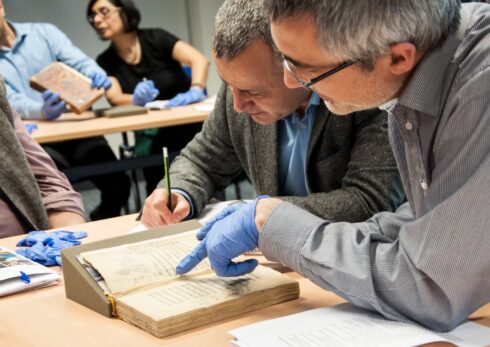Publications
The Institute of Ismaili Studies publishes works by its own scholars as well as from the academic community outside the Institute. The promotion of modern scholarship on the IsmailisAdherents of a branch of Shi’i Islam that considers Ismail, the eldest son of the Shi’i Imam Jaʿfar al-Ṣādiq (d. 765), as his successor. and their intellectual and cultural heritage is an important part of the Institute’s mandate. The publications arising from research in this field of Islamic studies now appear under the special imprints of the Ismaili Heritage Series and the Ismaili Texts and Translations Series.
IIS Publications
In facilitating these and other publications, the Institute’s purpose is to encourage original research and analysis of relevant issues. While every effort is made to ensure that the publications are of a high academic standard, there is naturally bound to be a diversity of views, ideas and interpretations. As such, the opinions expressed in these publications must be understood as belonging to their authors alone.
In order to promote its publications to a wider audience, to make them more accessible, and to assist the non-specialist reader, The Institute has developed a number of Reading Guides.
The Institute’s academic publications fall into several distinct and interrelated categories:
- Occasional papers or essays addressing broad themes on the relationship between religion and society, with special reference to Islam.
- Monographs exploring specific aspects of Islamic faith and culture, or the contributions of individual Muslim figures or writers.
- Editions or translations of significant primary or secondary texts which contribute to an understanding of Islam and Muslim cultures and societies.
- Translations of poetic and literary texts which illustrate the rich heritage of spiritual, devotional and symbolic expressions in Muslim history.
- Works on Ismaili history and thought, and the relationship of the Ismailis to other traditions, communities and schools of thought in Islam.
- Proceedings of conferences and seminars sponsored by the Institute.
- Bibliographical works and catalogues which document manuscripts, printed texts and other source materials of interest to the academic community.
To make the publications of the Institute accessible to broader, and non-English speaking audiences, they are selectively translated into Persian, Arabic, Urdu and other languages.
Most of the works which feature on this website are published through its affiliated company, Islamic Publications Ltd. (IPL), in association with publishers such as I. B. Tauris & Co. Ltd. This website also includes a number of other relevant works published elsewhere by the Institute’s scholars.
Neither the Institute nor IPL engages in marketing or distribution of books directly to the public. Readers wishing to purchase any publications, either for the book trade or personal use, are advised to place their orders with their local booksellers or distributors.




